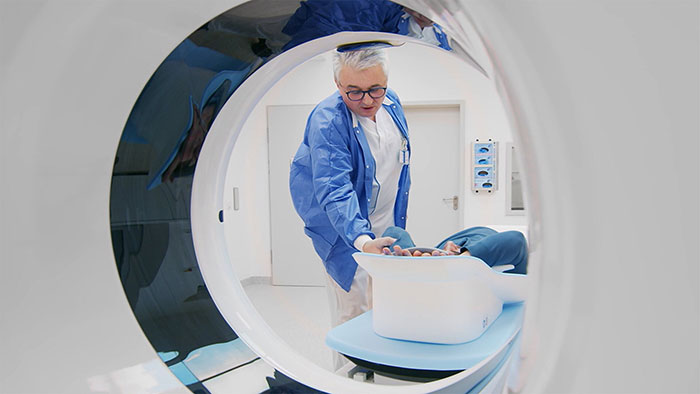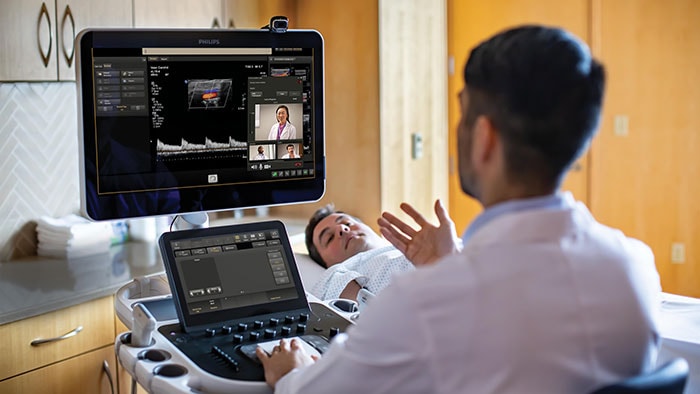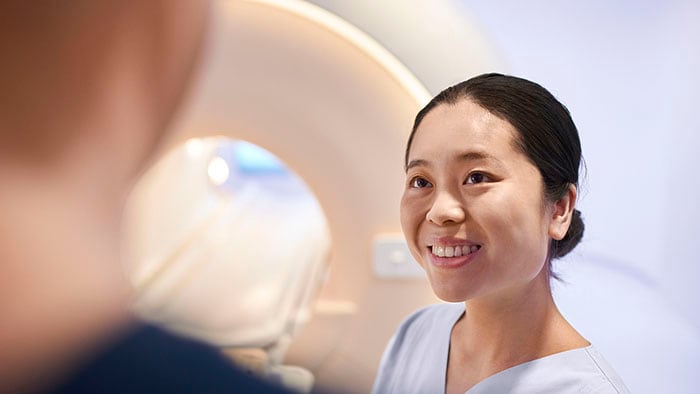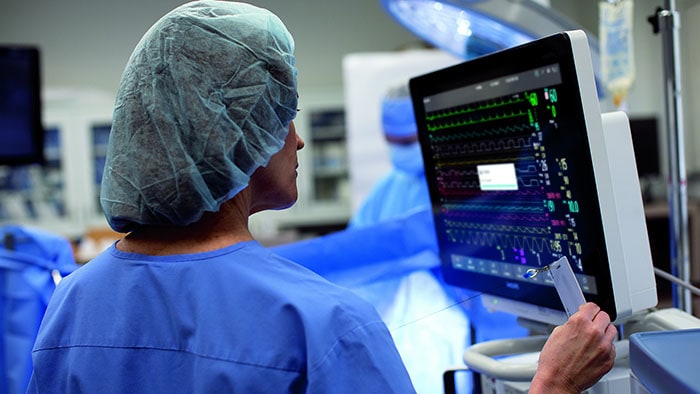janv. 25, 2021
Résultats de Philips au quatrième trimestre et résultats annuels 2020
Philips a réalisé un chiffre d'affaires de 6,0 milliards d'euros au quatrième trimestre, avec une augmentation des ventes de 7 % à périmètre comparable ; le résultat des activités poursuivies s'est élevé à 608 millions d'euros, la marge d'EBITA ajustée a gagné 110 points de base pour atteindre 19,0 % et le cash-flow opérationnel s'est élevé à 1 305 millions d'euros
Chiffres clés du quatrième trimestre Chiffres clés de l'année Frans van Houten, CEO de Royal Philips :
« Dans le contexte de la pandémie du COVID-19 en cours, nous avons continué à soutenir les prestataires de soins de santé et le personnel médical en leur fournissant des solutions aussi bien pour les soins intensifs liés au COVID-19 que pour les soins réguliers. Au cours du trimestre, Philips a conclu 25 nouveaux contrats stratégiques à long terme avec des hôpitaux aux États-Unis, en Europe et en Asie, pour les aider à atteindre leurs objectifs cliniques et opérationnels grâce à nos solutions intégrées. Nous avons également soutenu les consommateurs à domicile avec des solutions de télésanté telles que des services de télédentisterie et de télésurveillance.
Je suis heureux que, grâce à ces efforts, nous ayons enregistré au cours du trimestre et à périmètre comparable une croissance des ventes du Groupe de 7 % et une augmentation des commandes de 7 %. La marge d'EBITA ajustée a gagné 110 points de base et nous avons dégagé un important flux de trésorerie disponible de 1 055 millions d'euros.
Nous avons lancé plusieurs nouveaux produits et solutions au cours du trimestre, à l’instar du Philips Shaver Series 1000 qui répond spécifiquement aux besoins de soins personnels des jeunes hommes en Chine. Nous avons également introduit notre espace de travail IntelliSpace Portal de nouvelle génération pour une visualisation avancée avec des capacités d'intelligence artificielle pour aider à établir un diagnostic précis. Pour développer nos solutions de soins connectés, nous avons signé des accords portant sur l'acquisition de BioTelemetry et Capsule Technologies. Ces acquisitions permettront d'élargir et d'étendre encore les solutions de gestion des soins aux patients de Philips à l'hôpital et au domicile afin d'améliorer les résultats pour les patients, de rationaliser les flux de travail cliniques et d'augmenter la productivité. Nous visons d'importantes synergies de revenus, et ces activités contribueront à la croissance des ventes de Philips et de la marge d'EBITA ajustée en 2021. Il s'agit d'une autre étape importante de notre stratégie visant à devenir un fournisseur de solutions de premier plan.
Grâce à notre meilleure performance au second semestre, après un premier semestre difficile en raison de l'impact du COVID-19, notre performance a été résiliente. Pour l'ensemble de l'année 2020, nous avons enregistré une croissance des ventes de 3 % à périmètre comparable, une marge d'EBITA ajustée de 13,2 % et un important flux de trésorerie disponible de 1,9 milliard d'euros. De plus, portés par une croissance des commandes de 9 % à périmètre comparable, nous avons continué à gagner des parts de marché dans nos activités de soins de santé et avons terminé l'année avec un carnet de commandes bien rempli.
Je suis très reconnaissant et fier de l'engagement, de l'ingéniosité et du travail intense dont ont fait preuve nos plus de 80 000 employés en 2020. Grâce à nos efforts, nous avons été en mesure de respecter notre triple devoir de diligence : répondre aux besoins critiques de nos clients, préserver la santé et la sécurité de nos employés, et assurer la continuité de nos activités.
En ce qui concerne l'avenir, nous sommes toujours confrontés à des incertitudes liées à l'impact du COVID-19 dans le monde. Pour 2021, Philips prévoit de réaliser une légère croissance à un chiffre à périmètre comparable, portée par une forte croissance des secteurs « Diagnosis & Treatment » et « Personal Health » qui compense en partie la baisse des ventes du secteur « Connected Care », et une amélioration de la marge d'EBITA ajustée de 60 à 80 points de base. »
Business segment performance
The Diagnosis & Treatment businesses returned to growth, with 1% comparable sales growth in the quarter, driven by high-single-digit growth in Diagnostic Imaging. Comparable order intake showed a 3% increase, compared to a 5% decrease in the previous quarter. The Adjusted EBITA margin decreased to 14.0%, mainly due to mix changes. For the full year, the Diagnosis & Treatment businesses recorded a 2% comparable sales decrease and an Adjusted EBITA margin of 10.0%.
Comparable sales in the Connected Care businesses increased 24% in the quarter, with double-digit growth in Monitoring & Analytics and Sleep & Respiratory Care. Comparable order intake showed a 17% increase, with strong growth across all businesses. The Adjusted EBITA margin increased to 27.2%, due to operating leverage and productivity programs. For the full year, the Connected Care businesses delivered 22% comparable sales growth and an Adjusted EBITA margin of 21.5%.
The Personal Health businesses delivered a comparable sales increase of 5% in the quarter, with double-digit growth in Domestic Appliances and mid-single-digit growth in Personal Care. The Adjusted EBITA margin was 20.0%, in line with Q4 2019. For the full year, the Personal Health businesses recorded a 4% comparable sales decline and an Adjusted EBITA margin of 13.0%.
Philips’ ongoing focus on innovation and partnerships resulted in the following key developments in the quarter and the year:
Cost savings In the fourth quarter of 2020, cost savings totaled EUR 123 million, with procurement savings of EUR 67 million and savings from overhead and other productivity programs of EUR 56 million, resulting in annual savings of EUR 447 million in 2020. As a result, Philips has delivered EUR 1.9 billion productivity savings for the Group over the 2017-2020 period, exceeding the target of EUR 1.8 billion.
Report Fourth Quarter Results 2020 - Report Presentation Fourth Quarter Results 2020 - Results Presentation Conference call and audio webcast A conference call with Frans van Houten, CEO, and Abhijit Bhattacharya, CFO, to discuss the results will start at 10:00AM CET, January 25, 2021. A live audio webcast of the conference call will be available through the link below. Q4 2020 – Fourth quarter and full year 2020 results conference call audio webcast More information about Frans van Houten and Abhijit Bhattacharya Click here for Mr. van Houten's CV and images Click here for Mr. Bhattacharya's CV and images
Visit our interactive results hub for more on our financial and sustainability performance over the past quarter, including the latest version of our dynamic Lives Improved world map.
About Royal Philips
Royal Philips (NYSE: PHG, AEX: PHIA) is a leading health technology company focused on improving people's health and well-being, and enabling better outcomes across the health continuum – from healthy living and prevention, to diagnosis, treatment and home care. Philips leverages advanced technology and deep clinical and consumer insights to deliver integrated solutions. Headquartered in the Netherlands, the company is a leader in diagnostic imaging, image-guided therapy, patient monitoring and health informatics, as well as in consumer health and home care. Philips generated 2020 sales of EUR 19.5 billion and employs approximately 82,000 employees with sales and services in more than 100 countries. News about Philips can be found at www.philips.com/newscenter.
Forward-looking statements and other important information
Forward-looking statements These factors include but are not limited to: changes in industry or market circumstances; economic and political developments; market and supply chain disruptions due to the COVID-19 outbreak; Philips’ increasing focus on health technology; the realization of Philips’ growth ambitions and results in growth geographies; successful completion of divestments such as the divestment of our Domestic Appliances businesses; lack of control over certain joint ventures; integration of acquisitions; securing and maintaining Philips’ intellectual property rights and unauthorized use of third-party intellectual property rights; compliance with quality standards, product safety laws and good manufacturing practices; exposure to IT security breaches, IT disruptions, system changes or failures; supply chain management; ability to create new products and solutions; attracting and retaining personnel; financial impacts from Brexit; compliance with regulatory regimes, including data privacy requirements; governmental investigations and legal proceedings with regard to possible anticompetitive market practices and other matters; business conduct rules and regulations; treasury risks and other financial risks; tax risks; costs of defined-benefit pension plans and other post-retirement plans; reliability of internal controls, financial reporting and management process. As a result, Philips’ actual future results may differ materially from the plans, goals and expectations set forth in such forward-looking statements. For a discussion of factors that could cause future results to differ from such forward-looking statements, see also the Risk management chapter included in the Annual Report 2019. Third-party market share data Statements regarding market share, including those regarding Philips’ competitive position, contained in this document are based on outside sources such as research institutes, industry and dealer panels in combination with management estimates. Where information is not yet available to Philips, those statements may also be based on estimates and projections prepared by outside sources or management. Rankings are based on sales unless otherwise stated. Use of non-IFRS information In presenting and discussing the Philips Group’s financial position, operating results and cash flows, management uses certain non-IFRS financial measures. These non-IFRS financial measures should not be viewed in isolation as alternatives to the equivalent IFRS measure and should be used in conjunction with the most directly comparable IFRS measures. Non-IFRS financial measures do not have standardized meaning under IFRS and therefore may not be comparable to similar measures presented by other issuers. A reconciliation of these non-IFRS measures to the most directly comparable IFRS measures is contained in this document. Further information on non-IFRS measures can be found in the Annual Report 2019. Use of fair value information In presenting the Philips Group’s financial position, fair values are used for the measurement of various items in accordance with the applicable accounting standards. These fair values are based on market prices, where available, and are obtained from sources that are deemed to be reliable. Readers are cautioned that these values are subject to changes over time and are only valid at the balance sheet date. When quoted prices or observable market data are not readily available, fair values are estimated using appropriate valuation models and unobservable inputs. Such fair value estimates require management to make significant assumptions with respect to future developments, which are inherently uncertain and may therefore deviate from actual developments. Critical assumptions used are disclosed in the Annual Report 2019. In certain cases independent valuations are obtained to support management’s determination of fair values. Presentation All amounts are in millions of euros unless otherwise stated. Due to rounding, amounts may not add up precisely to totals provided. All reported data is unaudited. Financial reporting is in accordance with the significant accounting policies as stated in the Annual Report 2019. Market Abuse Regulation This press release contains inside information within the meaning of Article 7(1) of the EU Market Abuse Regulation.
This document and the related oral presentation, including responses to questions following the presentation, contain certain forward-looking statements with respect to the financial condition, results of operations and business of Philips and certain of the plans and objectives of Philips with respect to these items. Examples of forward-looking statements include: statements made about the strategy; estimates of sales growth; future Adjusted EBITA; future restructuring, acquisition-related and other costs; future developments in Philips’ organic business; and the completion of acquisitions and divestments. By their nature, these statements involve risk and uncertainty because they relate to future events and circumstances and there are many factors that could cause actual results and developments to differ materially from those expressed or implied by these statements.
Effective Q1 2020, Philips has simplified its order intake policy by aligning horizons for all modalities to 18 months to revenue, compared to previously used delivery horizons of 6 months for Ultrasound, 12 months for Connected Care and 15 months for Diagnosis & Treatment. At the same time, Philips has aligned order intake for software contracts to the same 18 months to revenue horizon, meaning that only the next 18 months conversion to revenue under the contract is recognized, compared to the full contract values recognized previously. This change eliminates major variances in order intake growth and better reflects expected revenue in the short term from order intake booked in the reporting period. This realignment has not resulted in any material additional order intake recognition.
In 2020, Philips revised the definition of net finance expenses used in the calculation of Adjusted income from continuing operations attributable to shareholders, to exclude fair value movements of limited life fund investments recognized at fair value through profit and loss. This change leads to more relevant information as the fair value movements are not indicative of Philips' performance. The fair value movements do not represent cash items. Philips believes making this change is helpful for investors to evaluate Philips' performance.
Per share and weighted average share calculations have been adjusted for all periods presented to reflect the issuance of shares for the share dividend in respect of 2019.
Prior-period amounts have been reclassified to conform to the current-period presentation.
Sujets
Contact

Ben Zwirs
Philips Global Press Office Tel: +31 6 1521 3446
You are about to visit a Philips global content page
Continue
Martijn van der Starre
Philips Global Press Office Tel: +31 6 2847 4617
You are about to visit a Philips global content page
ContinueBusiness Highlights Q4 2020
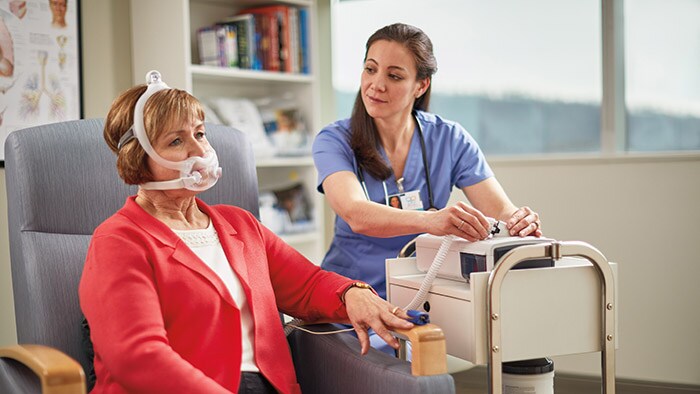
Expanding its range of patient-centric solutions for the home, Philips launched the BiPAP A40 EFL non-invasive ventilator.
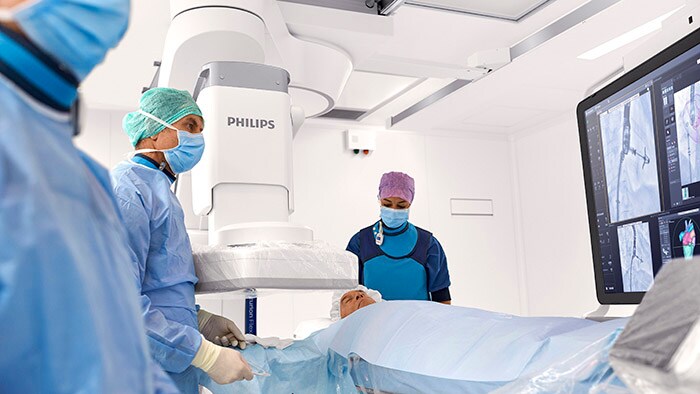
Philips signed 25 new long-term strategic partnerships in the quarter, including a 5-year technology and innovation partnership with Rennes University Hospital, one of the top 10 hospitals in France, with four sites and more than 1,800 beds.
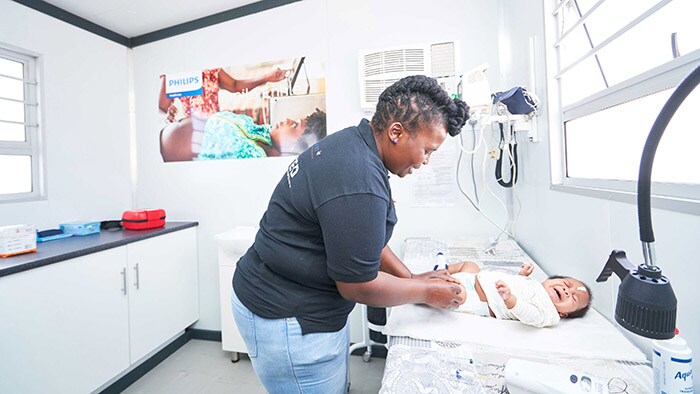
In 2020, Philips’ products and solutions improved the lives of 1.75 billion people, compared to 1.64 billion in 2019. This figure includes 207 million people in underserved communities, compared to 194 million in 2019.





